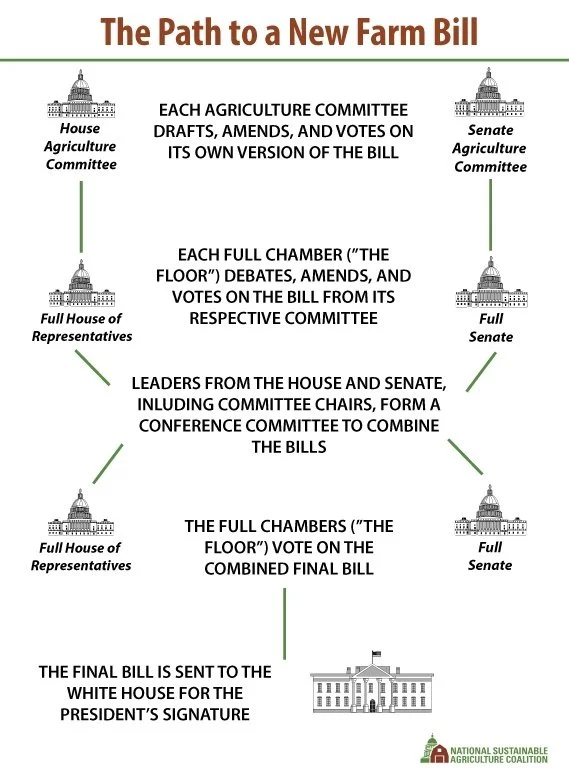Farm Bill Advocacy
Advocacy groups
National Sustainable Agriculture Network - What is the Farm Bill?
https://sustainableagriculture.net/our-work/campaigns/fbcampaign/what-is-the-farm-bill/
National Young Farmers Coalition - YOUNG FARMER AGENDA: THE FARM BILL 2017
https://www.youngfarmers.org/wp-content/uploads/2018/03/NYFC_Young_Farmer_Agenda_Farm_Bill.pdf
Reports
Change Lab Solutions. (2012). Growing change - changelabsolutions.org. Growing Change: A Farm Bill Primer for Communities. Retrieved May 26, 2022, from https://www.changelabsolutions.org/sites/default/files/GrowingChange_FarmBillPrimer_Final_20120514_0.pdf
Change Lab Solutions provides a primer for farm bill advocates to better understand the history, process, and chapters of the major legislative package. The endnotes provide an extensive list of resources about public health and farm bill advocacy.
Johnson, R., Fruits, Vegetables, and Other Specialty Crops: Selected Farm Bill and Federal Programs (2014). Congressional Research Service. Retrieved from https://www.fb.org/files/2018FarmBill/CRS_Report_on_Fruits_and_Vegetables.pdf.
Renee Johnson provides a summary of key subsidies offered through the farm bill and other federal agricultural programs. The report tracks the historical tract, and target group of programs, some dating back to the Perishable Agricultural Commodities Act of 1930, as well as more recent Farm Security and Rural Investment Act of 2002.
Seattle Local Food Action Initiative. (2011, May 28). Seattle Farm Bill Principles. Seattle Farm Bill Principles. Retrieved May 15, 2022, from https://web.archive.org/web/20110528075441/http://seattlefarmbillprinciples.org/seattle-principles/
In 2011 the Seattle City Council developed the Seattle Farm Bill Principles, which was a way for local government to express their preference for a farm bill.
Springmann, M., & Freund, F. (2022). Options for reforming agricultural subsidies from health, climate, and Economic Perspectives. Nature Communications, 13(1). https://doi.org/10.1038/s41467-021-27645-2
Reforming agricultural subsidies could play a role in supporting shifts towards healthier and more sustainable food systems. Agricultural subsidies are an important factor for influencing production. In 2016, they represented 25% of the value of production in OECD countries, and 15% in non-OECD countries6.


